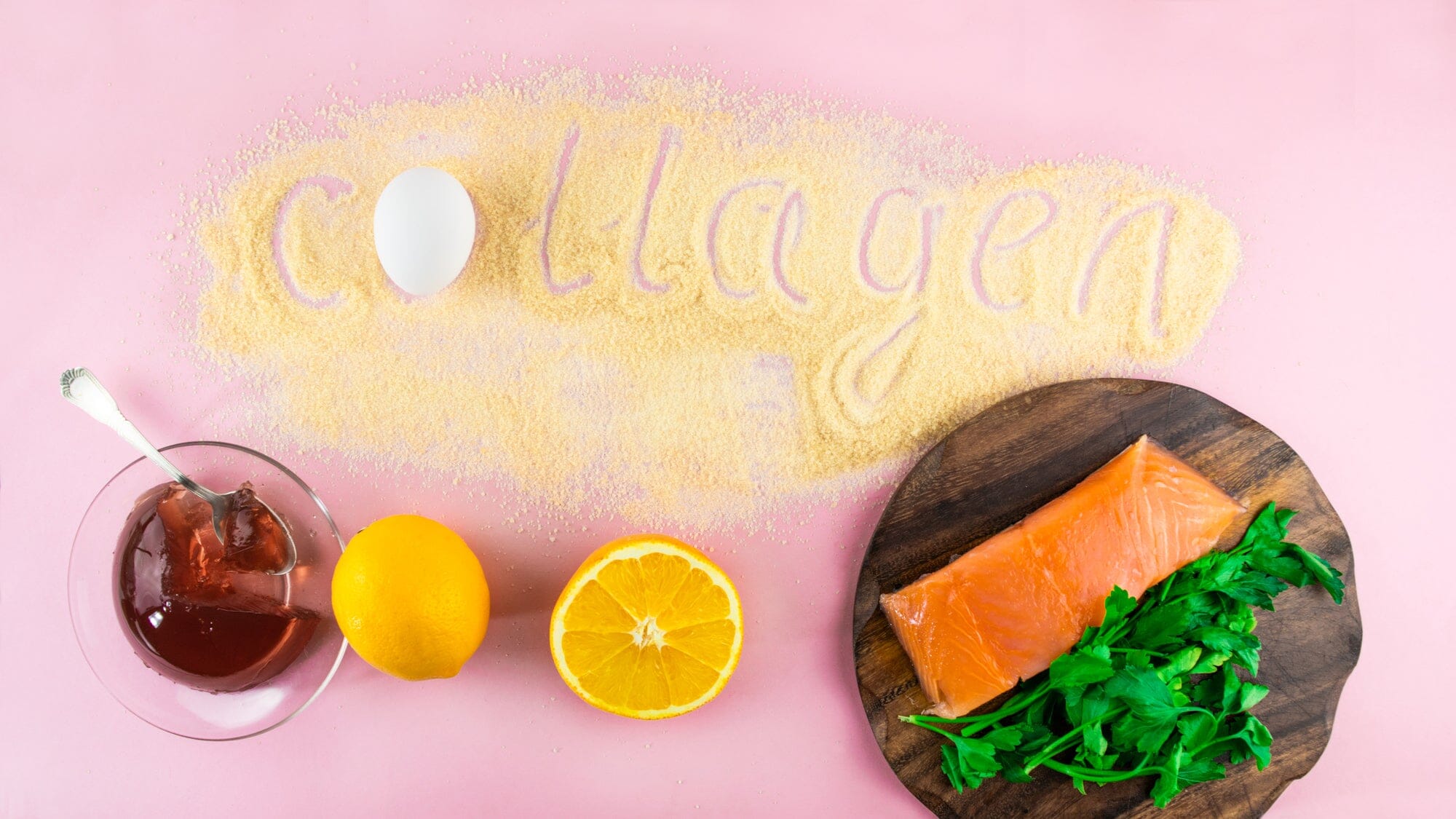Collagen is the ultimate multi-tasking protein. From keeping your skin smooth and supple to maintaining optimal bone and joint health, which helps keep our bodies moving as we age.
The older you get, though, the more you need collagen-rich foods in your diet. That’s because as you age, your body’s collagen production starts going downhill. In fact, the collagen reserves in your skin start to decline at 1% per year after you’ve reached your 20s.
So it makes sense to supplement your body’s dwindling collagen supply with whole foods and supplemental sources. That said, you can take too much collagen if you’re not careful.
But what foods are high in collagen? Does consuming them actually help boost your body’s collagen supply? Keep reading to find the answers to your most pressing questions.
Foods That Are Scientifically Proven to Increase Collagen
From bone broth soups and seafood to fruits and veggies, these are the foods that are either high in collagen or boost your body’s ability to synthesize the good stuff.
1. Bone Broth
Did you know that bone broth is rich in collagen? As the name suggests, bones and connective tissues from poultry, cows, or fish are boiled to produce a nutrient-rich broth. But does drinking it actually level up your collagen levels?
In a small-scale study, 15 healthy men were fed 20 grams of dairy and collagen proteins, on top of a 300-milliliters serving of bone broth after they fasted overnight. The results showed a distinct increase in specific collagen proteins, especially glycine which is present in collagen in high amounts. This suggests that bone broth has a bioavailable effect on the human body to increase collagen reserves.
That said, a 2019 study published in the International Journal of Sport Nutrition and Exercise Metabolism highlighted that you may actually consume fewer amino acids with bone broth than if you had taken a collagen supplement. What’s more, different bone broth recipes translate to “a large variability in the amino acid content,” signaling nutritional inconsistencies.
2. Gelatin
Where collagen is fully hydrolyzed, gelatin is its partially hydrolyzed version (read: partially broken down). That’s why gelatin is a naturally collagen-rich food, too.
Because of the way it’s created, gelatin has gelling and thickening properties. As such, it’s ideal for adding texture to your meals, whether it’s to thicken your stew or give a chewy bite to your protein brownies.
3. Eggs
Scrambled, sunny-side-up, or poached, eggs are another food source to supply your body with much-needed collagen. For starters, research shows that egg yolks are naturally infused with collagen. On top of that, egg whites possess high levels of proline, which is incidentally one of the key amino acids that make up the collagen molecule.
4. Vitamin C-Rich Foods

Vitamin C is touted as the do-it-all antioxidant, so it’s no surprise that it plays a vital role in collagen production, too.
According to science, vitamin C:
- Functions as a cofactor for the synthesis of proline and lysine, two important amino acids that give rise to the collagen molecular structure, and
- Stimulates the expression of the collagen gene
If you’d like to top up your body’s collagen levels with vitamins C, go for the following foods:
- Citrus foods, such as oranges, lemons, and tomatoes
- Berries, for example, blueberries and strawberries
- Dark leafy veggies, like kale and spinach
- Cruciferous vegetables, like broccoli
5. Seafood
Land animals (and some plants) aren’t the only ones packing a punch when it comes to collagen. Seafood, particularly the skin and scales, are prime sources of collagen, too. In fact, research highlighted that marine animals are “promising sources of collagen, because they do not harbor transmissible disease.”
As a bonus, marine collagen provides an avenue to recycle biomass that would otherwise be thrown away. This helps cut down on waste and, by extension, lessens the environmental footprint.
If you want to go the marine collagen way, we recommend only consuming wild-caught seafood that contains no genetically modified organisms (GMOs).
6. Foods High in Zinc
Potent food sources of zinc also help to supercharge your collagen supply. That’s because zinc plays a role in collagen production, according to scientific data. Consuming zinc-rich foods may thus positively impact your body’s collagen-synthesizing abilities.
For that reason, make it a point to include the following foods in your everyday diet:
- Oysters
- Crabs
- Lobsters
- Lamb
- Beef
- Nuts
- Whole grains
- Breakfast cereals
- Mushrooms
Supplemental Sources Are High in Collagen Too
You’ve now learned that various whole foods are high in collagen or collagen-producing micronutrients, like zinc and vitamin C. As much as you would like to whip up delicious, nutrient-dense meals to provide your body with the collagen it needs, modern life is hectic and full of commitments. In other words, many of us don’t have the time or energy to put much effort into brewing up a pot of home-cooked bone broth or sauteing salmon filets and cleaning up the kitchen afterward.
Some may argue there are always quick and convenient options, like pre-packaged bone broth or store-bought grilled salmon for lunch and dinner. But when you look at the nutritional information on the packaging, you’ll realize the added preservatives and MSG (monosodium glutamate) have transformed an otherwise healthy meal into something unhealthy.
Certain collagen-rich foods are also not palatable to all taste buds — think the fishy smell of raw oysters and the thick, greasy texture of bone broth. In this case, it’s a catch-22: You want to include collagen-rich food sources in your diet but just can’t find a way to do so hassle-free.
This is where Zen Principle’s collagen supplements come in handy. We offer three kinds to cater to everyone’s needs:
- Beef Collagen Peptides Powder: Made from grass-fed, pasture-raised cows in Argentina and Brazil, rest assured that our collagen powder is free of antibiotics, GMOs, and artificial additives. It’s also hydrolyzed for maximum absorption within the human body.
- Beef Gelatin Powder: Created from the same clean bovine origins as our Beef Collagen Peptides Powder, the Beef Gelatin version is great if you want to add a thicker texture to your dishes.
- Marine Collagen Peptides Powder: We use only fresh codfish, wild-caught from the North Atlantic Ocean in our hydrolyzed marine collagen formula. Guaranteed no fishy taste, you’ll be sure to enjoy this collagen supplement from the sea.
No matter if you’re someone who can’t — or doesn’t want to — cook but still looking to get enough collagen into your system, supplemental collagen is the way to go. So, what are you waiting for? Check out Zen Principle’s Collagen collection today!





